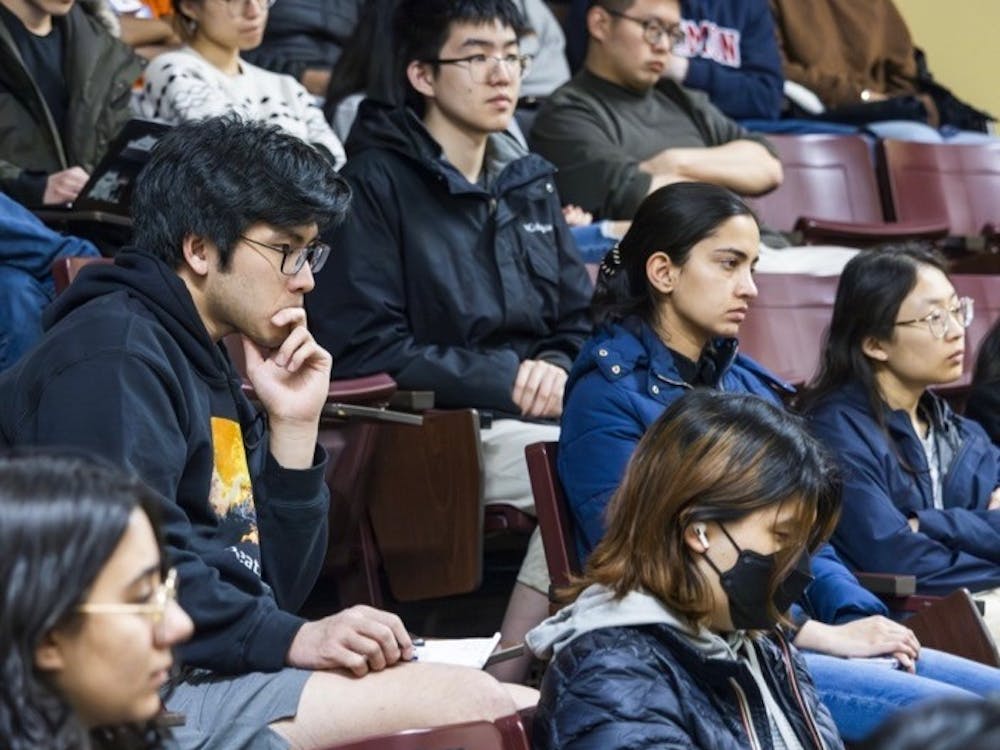It’s a typical Friday at Hopkins.
Sleep-deprived undergraduates join in a collective sigh of relief as they take shelter in the brief two-day buffer that separates them from the overwhelming amount of work that plagues every single student “privileged” enough to attend this hub of higher learning. They shake off their shoes, sink in their beds and rejoice in the glory that is freedom, albeit temporary.
In the past this “freedom” meant license to imbibe cheap beer or even-cheaper vodka in a dirty frat basement as your worries faded with the color of your shoes, and the problem set that kept you up until 3 a.m. the night before becomes part of a different lifetime.
However, these days “freedom” is, in the Janis Joplin sense, a better word for nothing else to do. With the crackdown from the administration on open parties, students are often left to languish on Friday night, devoid of an outlet to relieve some of their accumulated stress.
It isn’t just Hopkins students either; administrative curtailing of party culture has proliferated nationwide. A quick Google search of “Fraternity suspension” yields thousands of results, with a different fraternity getting the ax nearly every other day. The reasons are almost identical in all the cases: underage drinking, hazing violations and sexual assault citations constitute the majority of these offenses.
It isn’t that the fraternities themselves have grown more sinister in their practices as to warrant such high scrutiny; rather, there has been a growing awareness of the destructive behavior surrounding these environments.
It is undoubtedly true that there is a high potential for immoral conduct to occur in these spaces. However, assigning full responsibility to the fraternal system for the actions that occur within it is identifying a symptom instead of the root cause.
It is important to be cognizant of the fact that perpetrators of such acts did so of their own accord. While the system may have provided a conduit for them to behave in such a manner, the responsibility still lies with the participating individual. There is no denying that college-age students often have make bad decisions and exercise poor judgment, yet this is not because a fraternity made them this way. It is simple nature.
Taking away fraternities’ capabilities while providing no feasible alternative for recreation has a plethora of harmful potential. Students grow restless without the option for egress. Without an alternative to fraternity parties or open parties in general, there is no outlet to moderate the stress brought on by the workload of their respective courses, particularly at a place like Hopkins.
It is naïve for university administrations to be under the impression that by eliminating fraternities gradually, they can stop drinking and reckless behavior from occurring on campuses. Attempting to do so breeds an antagonistic relationship between the university and its student population.
Naturally, the university has an obligation to protect the best interests of its students, but this requires transparency of their intentions in order to build mutual trust. Total suppression of illicit behavior only leads to backlash and a further inclination to rebel. Perhaps if universities were to provide genuinely enjoyable recreational activities for their students to engage in there would be less of a need for them to look elsewhere.
This could include spending a greater portion of their resources to bring more exciting events to campus, such as additional performances, concerts and events that make students want to stay on campus rather than seek fun in more vulnerable places. They would have greater oversight over their students’ social lives and be able to identify individual offenders rather than blame a collective group of primarily innocent actors.
It is impossible to extinguish wrongful actions, but it is possible to monitor and distinguish the perpetrators who ruin it for the rest.
Through providing legitimate alternative means of having fun, universities can work with their students to nurture a safe and enjoyable atmosphere rather than an oppressive and antipathetic one.






















Please note All comments are eligible for publication in The News-Letter.